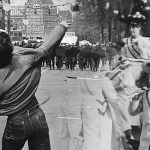 Clare Stainthorp (Queen Mary Univ. of London), Anton Jansson (Univ. of Gothenburg), and Madeleine Goodall (Humanists UK) (Web)
Clare Stainthorp (Queen Mary Univ. of London), Anton Jansson (Univ. of Gothenburg), and Madeleine Goodall (Humanists UK) (Web)
Time: 09.-10.09.2022
Venue: Queen Mary University of London
Proposals by: 01.03.2022
How did atheist, secularist, and humanist ideas circulate within and across nations in the long 19th century? This conference seeks to consider this question at both micro and macro scales, exploring the local, national, and international networks that enabled freethought to flourish. The 19th century was a period during which developments across physical and social sciences, politics and activism, technology and travel gave rise to new ways of conceiving the universe and humanity’s place within it. While it is abundantly clear that this did not lay an uncomplicated path towards secularisation, there were many individuals who through their lives, writings, and actions sought to establish a secular age.
The question of terminology is often fraught and, as Nathan Alexander (2019) observes, the terms used to frame the field of historical unbelief can often serve to reinscribe particularly Western concerns. Although the category of freethinker (or Freidenker, libre-penseurs, fritänkare etc.) is not exempt from such difficulties, we use it is a multivalent term that speaks more broadly to the freedom of thought, speech, and action that liberation from religious frameworks can instil. Furthermore, it was used in the 19th century to encompass a range of positions, from militant, antagonistic atheists to those with pantheist and deist beliefs that sit outside traditional religious frameworks, via many forms of doubt and agnosticism.
There has been a tendency for Anglophone freethought to be considered separately from European traditions, and both are often cut off from, and can overshadow, wider global currents. Recently, significant steps have been taken in making connections across such boundaries through edited collections such as the internationally orientated Cambridge History of Atheism, ed. by Stephen Bullivant and Michael Ruse (2021), and Freethinkers in Europe: National and Transnational Secularities, 1789-1920s, ed. by Carolin Kosuch (2020). This conference builds upon such publications, and as such the organizers warmly welcome proposals which explore how freethought discourses in the period c.1789-1914 operated on a global scale, and how the legacies of these persisted across the 20th century and through to the present. Read more … (PDF)
 Université Sorbonne Nouvelle (Web)
Université Sorbonne Nouvelle (Web)





